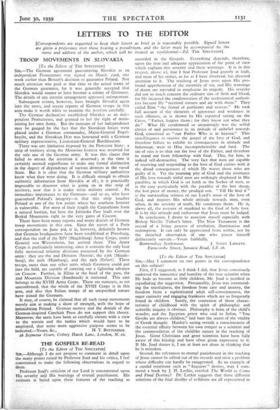THE GOSPELS RE-READ
[To the Editor of THE SPECTATOR]
SIR, Although I do not propose to comment in detail upon the many points raised by Professor Joad and his critics, I feel constrained to make the following observations in regard to them.
Professor Joad's criticism of our Lord is concentrated upon His severity and His ivainings of eternalpunishment. His estimate is based uion theie features of the 'teaching as
recorded in the Gospels. Everything depends, therefore, upon the true and adequate appreciation of the point of view which explains this severity and these warnings. It is in this respect, above all, that I find Professor Joad gravely at fault, and none of his critics, as far as I have observed, has directed attention to it. The teaching of Jesus rests upon His pro- found apprehension of the enormity of sin, and His warnings of doom are intended to emphasise its tragedy. His severity did not so much concern the ordinary sins of flesh and blood, for He incurred the condemnation of the ecclesiastical authori- ties because He " received sinners and ate with them." They called Him " the friend of publicans and sinners." He took full account of the elements of ignorance and weakness in such offences, as is shown by His reported saying on the Cross, " Father, forgive them ; for they know not what they do." What He condemned so unsparingly was the wilful choice of and persistence in an attitude of unbelief towards God, conceived as " our Father Who is in heaven." This unwillingness to receive the gospel of the love of God, and therefore failure to exhibit its consequences in attitude and behaviour, were to Him incomprehensible and fatal. The sin of sins is to shut out the love of the Father, and therefore to stand out from fellowship with God. This, for him, is indeed self-destructive. The very fact that men are capable of receiving and responding to the love of God carries with it the dread consequences of which He warns those who are guilty of it. Yet the yearning pity of God and the overtures of His love towards sinful men are strikingly displayed in His parables, in which God is set forth as the Seeker of men, as is the case particularly with the parables of the lost sheep, the lost piece of money, the prodigal son. " Till He find it " is the outstanding witness of our Lord's sense of the love of God, and inspires His whole attitude towards men, even when, in the severity of truth, He condemns them. He is, above all, the restorer of mankind to the God of holy love. It is by this attitude and endeavour that Jesus must be judged.
In conclusion, I desire to associate myself especially with Bishop Neville Talbot's letter. The New Testament is the record of a living process of revelation, illumination and redemption. It can only be appreciated from within, not by the detached observation of one who places himself deliberately outside.—Yours faithfully,










































 Previous page
Previous page